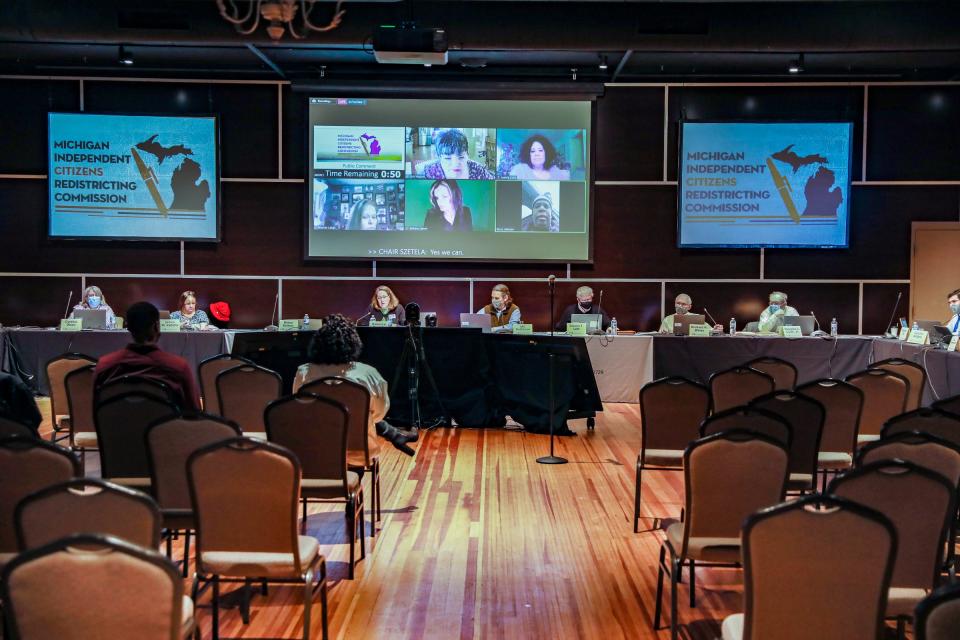Divided Michigan redistricting commission unable to act after three members leave early
LANSING — A divided Michigan redistricting commission sank into dysfunction Thursday, unable to make a decision on whether to appeal a recent court ruling that struck down as unconstitutional 13 of the metro Detroit legislative maps it drew.
One commissioner cried "sabotage" after three others did not return after a closed session that lasted more than two hours. Those absences, along with recent resignations, left the 13-member commission without a quorum and unable to pass a motion. The meeting was held virtually, over Zoom.
All three of the commissioners who were present at the start of Thursday's meeting but did not return after the closed session, held to decide whether to appeal the court ruling, had voiced opposition to appealing the ruling during the public session. They were Republican commissioners Rhonda Lange and Erin Wagner and Independent commissioner Rebecca Szetela.
Time is short to complete district maps
Lange and Wagner both said they were called away by emergencies, while Szetala, an attorney, said she had pressing legal work to take care of, commission Executive Director Edward Woods III said.
Some other commissioners weren't buying all of those stories.
"They pretty much sabotaged this meeting, on purpose," said Independent commissioner Richard Weiss.
Another independent commissioner, Anthony Eid, called the absences "a delay tactic, at a minimum."
Time is tight to finalize maps before the 2024 election, and any decision on an appeal, which would go to the U.S. Supreme Court, would need to be made quickly. The commission is next scheduled to meet on Jan. 11.
On Dec. 21, a three-judge federal court panel struck down a significant portion of the commission's map-drawing work.

In response to a lawsuit brought by Detroit voters, the court ruled that 13 state legislative maps running through the majority-Black city are unconstitutional because race predominated in Michigan's first-ever citizen-led mapping process. The judge said the maps were drawn in violation of the Equal Protection Clause of the U.S. Constitution, which prohibits drawing district lines on the basis of race. Under the ruling, the maps must be redrawn and no more elections can be held under the current lines.
At the urging of attorney David Fink, commissioners voted 8-3 to go into closed session to hear legal advice about how to proceed. A closed session requires a two-thirds vote, so the eight "yes" votes were the minimum number needed.
Before moving to closed session, several commissioners expressed their opinions on whether to file an appeal. That was against the advice of Fink, who said anything said could potentially be used as an admission in the legal fight.
'An insult to the Black voters in Detroit'
Accepting legal advice during an open session would restrict what the commission's lawyers would be able to say, and holding a legal discussion in public would be like the commission playing poker with only its cards dealt face up, while its legal opponents keep theirs hidden, Fink said.
Commissioner Steven Lett, a semiretired attorney who sits as an independent, said during the public session that the commission should file an appeal and also request a stay of the recent ruling, which would leave the current maps in place until the legal case is resolved.
Lange said she is "adamantly opposed" to an appeal. "I think the court got the ruling right," Lange said.
Szetela, who testified during a recent federal trial in Kalamazoo that the commission's map-drawing was "100% about race," said she is also opposed to appealing and questioned what the grounds for an appeal would be. The panel made "pretty robust factual findings," which an appellate court would be reluctant to overturn, she said. Szetela expressed concern about the cost of continued litigation, saying the commission has already spent over $5 million on legal fees, much of it related to the current case.
Appealing the ruling "is kind of an insult to the Black voters in Detroit," Szetela said. "I'd rather just see us redraw maps and be done with the litigation."
Republican Commissioner Erin Wagner said she agreed an appeal would be "a big disservice to the people of Detroit."
Dustin Witjes, a Democrat who resigned from the commission Dec. 20, used the public comment section of the meeting to urge his former colleagues to "appeal and appeal hard."
Bruce Adelson, the voting rights attorney who provided advice to the commission during the mapping process, gave notice Wednesday that he is resigning effective Friday, Woods said.
It's not clear what role the commission will have in drawing new maps.
Sherry Gay-Dagnogo, a former state lawmaker who is a spokeswoman for the Detroit plaintiffs, said at a Wednesday news conference the court should appoint an expert attorney known as a "special master" to assist with drawing the new lines.
"We can't depend on the commission," she said at the news conference in Detroit, a video of which she posted on Facebook.
The Michigan Independent Citizens Redistricting Commission, created as a result of a 2018 vote to amend the state constitution, is composed of four Democrats, four Republicans, and five commissioners who are not affiliated with either party. Its numbers are down currently, due to a spate of resignations.
Contact Paul Egan: 517-372-8660 or pegan@freepress.com. Follow him on X, formerly known as Twitter, @paulegan4.
This article originally appeared on Detroit Free Press: Redistricting commission unable to act after three members leave early

